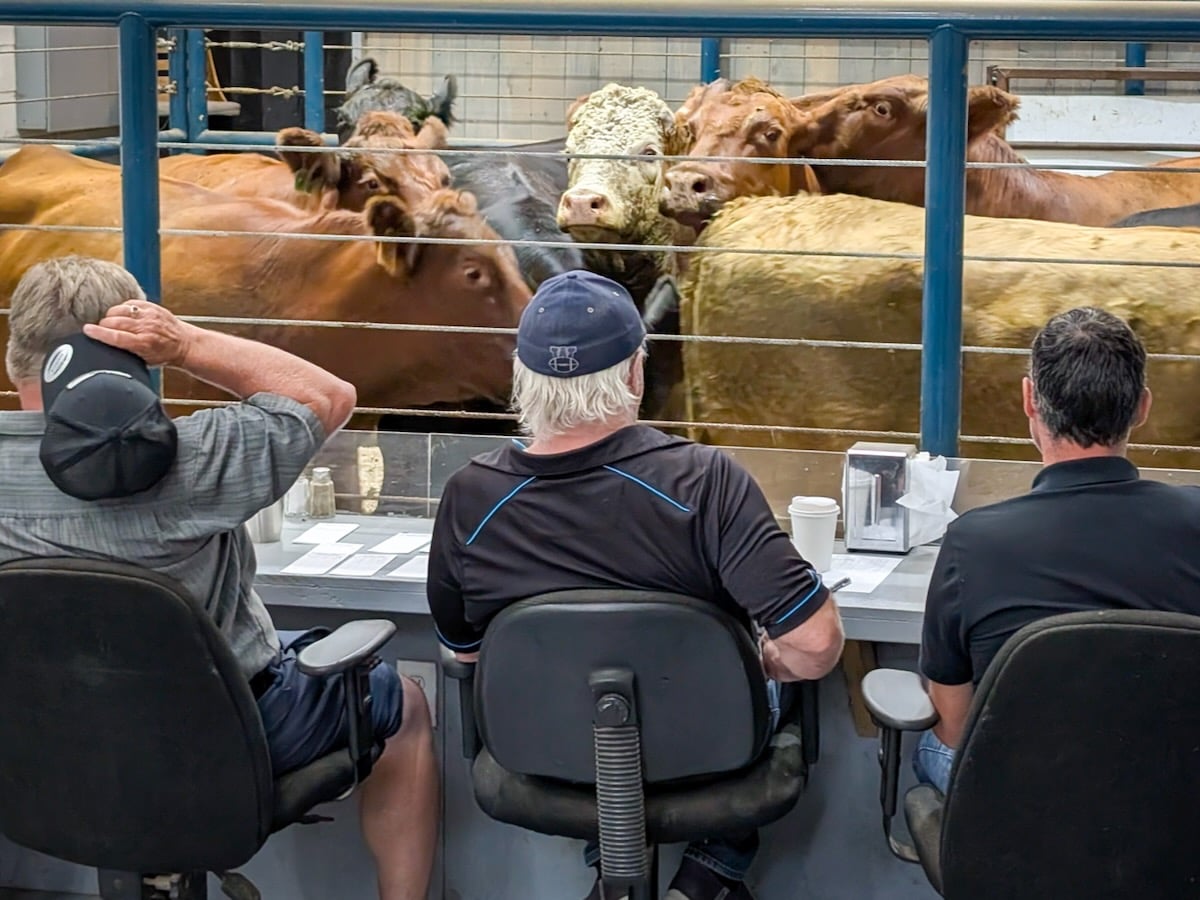The potato industry, similar to most other businesses is constantly changing and contracting in numbers as aggressive, more efficient operations purchase some of the smaller operations.
This same situation has happened to many of the industry suppliers – the chemical companies, fertilizer companies, farm machinery companies – the same phenomena that happens in the city with big box stores and large chain stores. Other agricultural commodities such as milk production, chicken production, hog production and grain production have gone, or are going to larger units.
RELOCATION
Read Also

Manitoba cattle prices, Jan. 28
Price ranges for cattle sold at five Manitoba livestock auction markets during the week ending Jan. 27, 2026
I believe the potato industry, headed down this path following the wet fall and early snowfall (Oct. 6, 1959 and it stayed) that caused many of the potato and vegetable farms to lose most of their crop. The industry had largely been located north and south of Winnipeg, when the market was relocated to lighter soils to simplify harvest.
The Gowryluks moved to Holland, the Daleboziks to Treherne, the Connerys and the Goberts to Portage la Prairie and Steve Kaminski to Carberry.
Some of these moves have had tremendous influences in these areas as J. R. Simplot came to Carberry in, I believe, 1961 which has led to the potato-processing industry in Manitoba. The relocation to Portage probably led to Campbell’s Soup and later McCain Foods and Simplot Canada facilities in Portage. Forty years ago, some Winnipeg/ Lockport potato growers had processing contracts, but have long ago left the processing potato industry.
CONTRACTION ONGOING
In recent times, there is another contraction in numbers. But the industry size has stayed relatively stable despite the tough economic conditions in which all producers must compete. The process industry has lost 13 producers in the last three years.
Until recently, quota or the producers’ “share” of the market could not be transferred unless the whole farm was purchased. A few years ago, the elected Peak of the Market board members arrived at an option to allow the sale of the quota, thus allowing small producers the chance to sell the quota and also remain farmers.
These transactions allowed more efficient producers the opportunity to bid on the quota offered for sale, thus generating higher prices for the quota as these producers did not necessarily want to relocate to the areas that had quota for sale.
ALLOWS FOR CHANGE
This is not to say that everyone is happy about leaving the business or with the price offered, but it does allow change. The situation of the new minimum quota being 6,000 bags could also be viewed as a change to allow new producers a more realistic opportunity to enter. With 3,000 bags (the former minimum), the producer had to purchase equipment or make arrangements for someone else to wash, grade and pack for them. Realistically 3,000-bag quota can be produced on 20 acres or less and is hardly economically viable. As a comparison in the process potato sector, it is rare to have a producer under 200 acres.
Another factor that has tended to hasten consolidation is the ever-increasing regulations with which producers must comply. Some producers see the ever-increasing paperwork as a chore that unless they are of an adequate size to hire someone to complete, the producer himself must do.
INCREASING PAPERWORK
This relatively new list includes the On-Farm Food Safety Program and audits, the Environmental Farm Plan, water licences, environmental assessment and licences, Workers Compensation, labour standards, Workplace Health and Safety programs, nutrient management plans on top of the need to keep up with new production technology, new pests and ever-changing pesticides.
Take the opportunity to look around in the grocery store and you will see that our producers must compete price-wise and quality-wise with producers from around the world. Can we be as sure about the food safety and environmental impact of imports? Our producer’s story goes untold, but changes are necessary to allow the efficient producers a better chance to compete in the global economy.
Hopefully, the Peak board can find a workable solution to allow small producers to continue to supply farmers’ markets and roadside sales for customers who choose this option.
Garry Sloik is a former grower, and longtime potato industry
employee. He is presently manager of Keystone Potato
Producers Association, the marketing agency for processing
potato producers in Manitoba.













